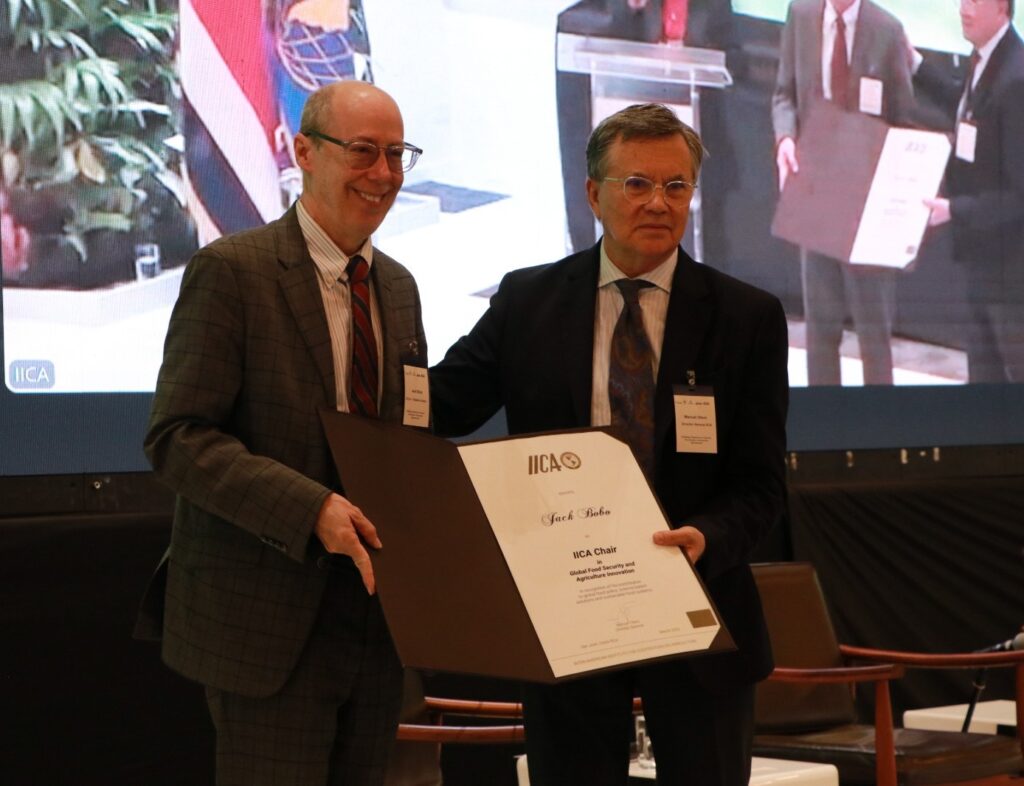
San José, 27 March 2025 (IICA) – Professor Jack Bobo, globally recognized for his contributions to food policy, science-based solutions, and sustainable agri-food systems, has been awarded the title of “IICA Chair” by the Inter-American Institute for Cooperation on Agriculture (IICA) in Global Food Security and Agricultural Innovation.
“This is a humble distinction compared to his many achievements,” said IICA Director General Manuel Otero as he presented the diploma to Bobo at the Institute’s headquarters.
The ceremony took place within the framework of the Second Regional Dialogue on Science, Technology, and Innovation in Agri-Food Systems of Latin America and the Caribbean, which gathered leading figures in agricultural science and technology in San José, Costa Rica.
As a global expert in sustainable food systems, Bobo has made transformative contributions to global food security. His work has underscored the crucial role of technology in improving food production while minimizing environmental impact.
He has also been instrumental in shifting the narrative on agriculture from one of crisis to one of opportunity. Notably, he has gained significant recognition for his innovative approach to science communication, particularly regarding the transformations occurring in agriculture and the best ways to convey its importance for food security, environmental sustainability, and the role of innovation.
Bobo is currently the Executive Director of the Rothman Family Institute for Food Studies at the University of California, Los Angeles (UCLA). Until last year, he served as Director of the Food Systems Institute at the University of Nottingham, United Kingdom. He was previously a Senior Advisor on Food Policy at the U.S. Department of State and is the author of the book Why Smart People Make Bad Food Choices.
Shaping the future
“The challenges we face in agriculture are vast and complex. We won’t be able to tackle them without collaboration among different stakeholders because the next 25 years will be the most critical in agricultural history. We need to get things right, and we must not prepare for the future we expect to happen; rather, we must create the future we want,” Bobo stated at IICA headquarters upon receiving his diploma.
Otero highlighted that Bobo’s work in global food policy has had an impact across the Americas, Africa, Asia, and Europe. “Transitioning from policy to practice, his work with smallholder farmers worldwide has been phenomenal and is deeply rooted in his commitment to sustainable and innovative agriculture and food security,” he said.
“Jack has consistently championed the importance of supporting smallholder farmers, emphasizing their crucial role in achieving global food security. He has demonstrated his firm belief that empowering these farmers with access to technology and resources can significantly enhance their productivity and sustainability,” added the IICA Director General.
The “IICA Chairs” program was established in 2018 to provide top-tier technical cooperation focused on generating new knowledge to transform agriculture and contribute to rural development in the Americas.
In this regard, Otero emphasized that Bobo’s work aligns closely with IICA’s approach to advancing the transformation of global food systems, summarized in three key messages: agriculture is part of the solution; farmers must be at the center of discussions; and science must drive decision-making in the transformation of the agricultural sector.
Distinguished academics who have been awarded this title include soil scientist Rattan Lal (IICA Chair in Soil Science); Mexican researcher in genetic engineering and molecular biology Gabriela Olmedo (IICA Chair in Biotechnology and Innovation); and Argentine biochemist Raquel Chan, creator of drought-resistant HB4 wheat and soybeans (IICA Chair in Biochemistry and Sustainable Development).
Other IICA Chairs include Marcos Jank (IICA Chair in International Trade and Food Security), Professor of Agribusiness at the Institute of Education and Research (INSPER), Brazil, and Coordinator of INSPER Agro Global; former Argentine Secretary of Agriculture Fernando Vilella (IICA Chair in Bioeconomy); University of California, Berkeley Professor of Agricultural and Resource Economics David Zilberman (IICA Chair in Bioeconomy and Sustainable Development); former Brazilian Minister of Agriculture Roberto Rodrigues (IICA Chair in Agribusiness); the Institute of Physiological and Ecological Research Related to Agriculture (IFEVA) at the Faculty of Agronomy, University of Buenos Aires, Argentina; and Professor Emerita of the Pontificia Universidad Javeriana, Elizabeth Hodson.
More information:
Institutional Communication Division.
comunicacion.institucional@iica.int











